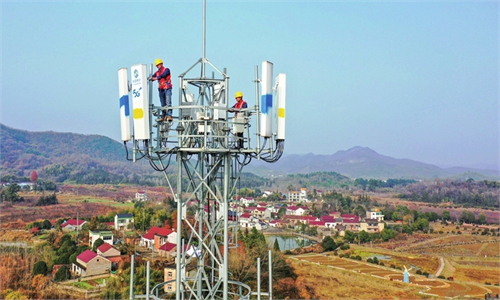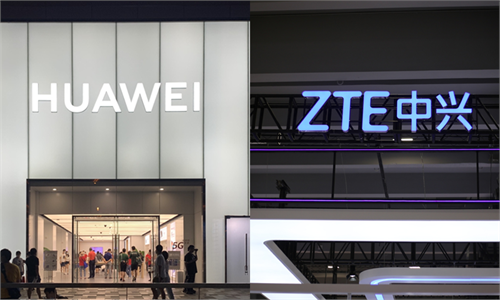After three years of 5G commercial use, Chinese firms eye next generation of network

A media professional tries 5G-powered virtual driving during the 2021 World 5G Convention in Beijing, capital of China, Aug. 31, 2021.(Photo: Xinhua)
It was only three years ago that Chinese telecoms authorities granted the first batch of 5G licenses for commercial use. Three years later, with over 1.6 million base stations installed nationwide and the number of 5G mobile phone users far exceeding 410 million, the large-scale application of 5G in China has entered a critical period, nurturing enormous economic driving force, companies and experts said on Monday.After the initial success in 5G, Chinese companies are aiming to seize the advantages and explore next generation of mobile network.
"Based on the successful experience of 5G development and the pioneering spirit, we will take the initiative to explore '5.5G' industries," Wang Tao, Huawei's managing director and president of ICT products and solutions, said during an industry summit held jointly by China Mobile, Huawei and other major industrial players on Monday.
China has become the first country to build a 5G network based on the scale of its independent networking mode. Many players in the sector have made outstanding achievements. For instance, leading telecom carrier China Mobile has opened over 850,000 base stations, accounting for one-third of the total in the world, according to a statement sent to the Global Times by the company on Monday.
In addition to a mega network deployment and colossal user base, China Mobile has launched a project integrating 5G with China's home developed BeiDou Navigation Satellite System, offering high-precision positioning service for autonomous driving and other areas.
China Mobile also launched the world's first drone-5G base station to rebuild a network urgently after a disastrous rainstorm in Central China's Henan in last July.
Over the past three years, 5G applications have expanded greatly, covering transportation, medical care, education, culture and tourism and many other areas, with more than 20,000 applications, according to the Ministry of Industry and Information Technology (MIIT).
Behind these achievements lies the advanced research and development (R&D) capability that Chinese firms have accumulated. Despite years of crackdowns by the US and its allies, Huawei remained the largest holder of 5G patents across the world.
As a country, China has the largest share of 5G patents in the world, accounting for 26.79 percent of the total, followed by South Korea and the US, according to some reports.
The MIIT and other departments aim to accelerate the construction of 5G and other types of digital infrastructure. They want China to seize the critical period of 5G large-scale applications, with a focus on three areas - new information consumption, the real economy and people's livelihood services.
"5G technology's application is already invigorating the economy, ranging from the direct economic benefit of hardware deployment to epidemic prevention and online education and work promotion," said Ma Jihua, an industry veteran.
"More importantly, it is playing a crucial role in the industrial upgrading of China's manufacturing," Ma told the Global Times on Monday.
Based on the world's largest deployment of networks and user bases, it is expected that 5G applications will see explosive growth in the coming years, facilitating the growth of various industries, Ma said.
As a frontrunner in 5G, China has developed prominent advantages in nearly every aspect, and the nation has a leading position in the R&D of next-generation networks, Ma added.
By accelerating 5.5G technological innovation, IT cluster integration and 5.5G industry application exploration, it will support the high-quality development of the digital economy, Wang said.



